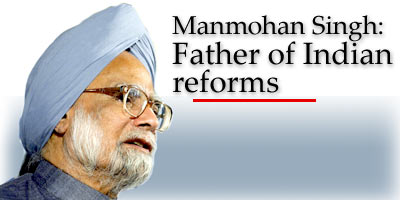
In the last five years, somewhere in the haze of India's rapid economic growth and the glowing corporate performance, the spotlight turned away from one man who years ago had changed the way India's economy moved.
Dr Manmohan Singh.
As finance minister in Narasimha Rao's government of the nineties, Manmohan Singh was the man who ushered in the reforms that liberalized India's economy, changing the fundamental way that in corporate India thinks and with it the lives of millions of middle class Indians.
Singh is an accomplished economist and had spent much of his career as a bureaucrat -- he was even the Governor of Reserve Bank of India from 1982-85 -- before he got inducted into politics and into Rao's cabinet as the finance minister.
Baptism by fire
In the 1991, when Singh became the finance minister, India's economy was in a shambles. The country had an unsustainable fiscal deficit of close to 8.5 per cent of the gross domestic product -- almost double of what it is currently.
There was a huge balance of payments deficit. The current account deficit was close to 3.5 per cent of GDP and there were no foreign lenders who were willing to finance it.
India had barely a billion dollars in terms of foreign exchange reserves -- roughly equal to two weeks' imports (today forex reserves stand at over $118 billion).
In short the country was on the verge of bankruptcy.
The healing process begins
Singh slowly started the process of restructuring the economy.
By 1994, when he presented his historic budget, the economy was well on its way to recovery. Yet he ploughed ahead instituting deep changes in the institutions of the country.
He went to Prime Minister Narasimha Rao and told him that India needed a strong vision to take it forward.
"I said to him it is possible that we will still collapse, but there is a chance that if we take bold measures we may turn around, and that, I said, is an opportunity. We must convert this crisis into an opportunity to build a new India, to do things which many people before us have thought and said should be done, but somehow were never done," said Singh in an interview to PBS in 2001.
Rao backed Manmohan Singh to the hilt and India embarked on a path of reforms.
Under Singh, that year, the government of India entered into an understanding with the Reserve Bank of India to deny itself the right to 'draw' on the RBI to fund its deficit. This put paid to the unlimited monetisation of fiscal deficit, and was a historic step.
Looking back, Singh says that when he stood up in Parliament stating the case for reforms his argument was that in the midst of an unprecedented crisis, it was time to think big rather than 'tighten the belt.'
"We could, in a traditional way, tighten our belt, and we did that, tighten and tighten. But persistence on that path would have led to more misery, more unemployment, and I said there is an alternative path. Stabilisation plus a credible structural adjustment programme would shorten the period of misery. It would release the innovative spirit, [the] entrepreneurial spirits which were always there in India in [such] a manner that our economy would grow at a much faster pace, sooner than most people believed. That's exactly what happened," says Singh in that interview.
During his speech in Parliament while presenting the Budget in 1994-95, he quoted Victor Hugo: "No power on earth can stop an idea whose time has come."
His dream was that in a crisis India should undertake basic structural changes, which would lead to the emergence of a new country that would become a major global player in the world economy.
Singh started the process of simplification and rationalisation of the tax system. Many controls and regulation on the industry were removed, which meant the death of the Permit Raj and a free rein to entrepreneurs.
The result was that productivity in the Indian industry grew like never before.
An unassuming personality
After the Congress was voted out of power, Singh kept a rather low profile, though he was the leader of the opposition in the Rajya Sabha.
Always a quiet, unassuming personality, out of the spotlight Singh faded into the background.
Except when his name began to be tossed around as an alternative to the position of the prime minister to those who could not accept Sonia Gandhi.
Singh himself never said a word about his ambitions or aspirations and has pretty much been a loyal supporter of the Gandhi family.
On matters political, Singh has always remained quiet -- both during his stint as finance minister and out of power. His only indulgence in the last two years has been to comment on the Budget.
Last year's budget (2003-04) put forth by Jaswant Singh came under severe criticism by Singh who termed it a budget of 'tokenisms.'
Manmohan Singh felt that Jaswant Singh, the finance minister, had refused to address the basic problems facing the economy in terms of eradication of poverty, infrastructure development, agriculture development and fiscal consolidation.
He holds an M.A., D.Phil. (Oxford), D.Litt.(Honoris Causa); I.N.C.(Assam).
He was born in Gah, West Punjab, on September 26, 1932 to Mr Gurmukh Singh and Mrs Gursharan Kaur.
If he comes back as the finance minister, Singh faces a very different economy from what he inherited about 10 years ago.
Far from being close to defaulting on its international debts, this time the economy is sizzling, having posted 10.4 per cent GDP growth last quarter. There is also a national consensus on the need for economic reforms, liberalisation and corporate-friendly policies.
While Singh has never elucidated on his vision of how to take India ahead, there cannot be any doubts that the economy will be safe in his hands.
Dr Manmohan Singh is the 'father of the reform process' in India and his return to North Block and the chair of the finance minister will only bring the original visionary back to the throne.





